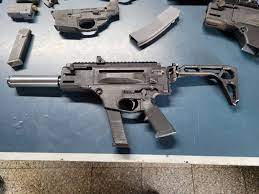The National Firearms Act (NFA) of 1934, enacted during a period of significant social upheaval and rising crime rates, has become a cornerstone of the federal firearms regulation within the United States. Its main focus is controlling and regulating firearms that were deemed especially hazardous or susceptible to misuse, like machines guns, short-barreled firearms and shotguns as well as suppressors and other destructive devices. The legislation was prompted by the need to combat the rising violence linked to organized criminality during the Prohibition time period, and also to control the proliferation of high-risk firearms.
One of the main components in an important aspect of NFA is the requirement for registration. All licensed firearms and other devices have to register with Bureau of Alcohol, Tobacco, Firearms, and Explosives (ATF). This registration process involves submitting complete information about the firearm, the owner, and the intended usage. Furthermore, the NFA has a tax specific on these weapons that varies based on the type of weapon. For instance it will be $5 on silencers and $200 on machine guns or destructive devices. The tax not only serves as a financial barrier but also as a regulatory mechanism to ensure that the possession and the transfer of such items are carefully checked.
The NFA also requires extensive background checks for those who want to purchase or transfer objects. This process is designed to stop people with criminal records or other reasons that prevent them from being able to acquire dangerous weapons. The background check involves an extensive review on the person’s background, criminal background and mental health condition and other factors that are relevant. The goal is to ensure that only law-abiding and responsible citizens are able to have these items.
Despite its intentions, the NFA has been a subject of controversy and debate. Many critics believe that it puts unreasonable restrictions on legitimate gun owners and hinders those who want to use firearms to fulfill legitimate needs, such as hunting or for shooting sports. They contend that the act disproportionately affects law-abiding citizens rather than addressing the root causes of gun violence. However, the advocates argue they believe that NFA is crucial to maintaining public safety and preventing the use of dangerous firearms. The argument is that regulations and safeguards imposed through the NFA are necessary to combat organized crime and safeguard communities.
In general, it is clear that the national firearms act remains a critical piece of legislation in the area of firearm regulations. It sets out an extensive framework to regulate and supervise certain types of firearms and devices, aiming to maintain a balance between public safety and individual rights. Understanding the NFA’s regulations and the historical context of its implementation is crucial for all those involved in the field of firearm ownership and regulation or advocacy.



